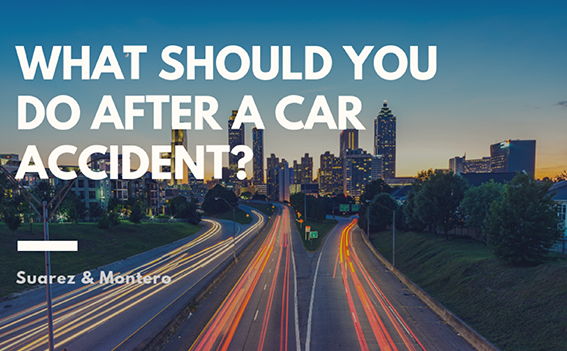
Top 5 Questions to Ask After A Car Crash
Sometimes things happen in life that disrupt your daily routine. Sadly, this includes traffic accidents. Anyone who drives or rides in a car long enough is likely to be involved in at least a minor fender bender. Anyone who rides a bicycle or motorcycle knows the roads are even more dangerous for two wheelers. On a crowded street, pedestrians are too often involved in accidents with buses, cars, and bikes. Knowing the laws of the road and the best steps to take when an accident occurs can help ease the pain of any accident that occurs. It can also help any make any claims process go a lot smoother too. When you get involved in an accident, whether you are at fault or not, you may have plethora of questions regarding what to do after the accident and how to deal with insurance companies in order to get compensated. With so many questions swimming around in your head after a crash, the first thing to remember is to avoid the panic of the situation and know that there are plenty of answers available to all your questions. In this blog post, we will address 5 important questions many car accident victims ask after being involved in a car accident.
What if the cause of the crash is not certain? In order to figure out who is a fault in a traffic accident it’s basically a matter of figuring out who was careless or negligent. Each state (including Florida) has its own set of traffic rules and they apply to cars motorcycles bicycles and pedestrians. Sometimes it is obvious that one driver has clearly violated a traffic regulation or law. In other types of car accident cases, it is not so obvious. It is sometimes difficult to figure out whether one particular act caused an accident or not. This is especially the case when you claim that the other driver did something that is minor or not clearly a violation of a traffic law. If you can show that the other driver made several errors while driving or committed several traffic violations, then you may have enough evidence to show the accident was the other driver’s fault.
Do I need to report my accident? In many states you are required to report a vehicle accident resulting in physical injury or a certain amount of property damage to the states department of motor vehicles check with the insurance agent or your local department motor vehicles to find out the time limits for finding the support you often have just a few days you should ask whether you’ll need any specific form for the report if you must file police report or any report there in the report ask for a statement about how the accident occurred very brief statement and admit no responsibility for the accent similarly if you official form ask what your injuries are, list every injury and not just the most serious or obvious ones. insurance company could later have access to the report and if you failed to mention a specific injury, they may try to claim that you did not sustain said injury.
How does no fault insurance work? There are some special rules that apply to no-fault policy holders. Almost half of states half of the states have some form of no-fault auto insurance or socalled personal injury protection. In general, no-fault coverage eliminates personal injury liability claims and lawsuits in smaller accidents exchange for direct payment by the injured persons own insurance company for medical bills and lost wages up to a certain dollar value. Regardless of who’s at fault for the accident, this coverage will apply. In Florida, all drivers are required to purchase personal injury protection insurance and this coverage will cover medical expenses and lost wages up to $10,000. In general, no-fault coverage illuminates the need usually no fault does not cover vehicle damage. Instead, those claims are still handled by filing a liability claim against the one who is responsible for the accident or by looking to your own collision insurance.
Who is liable if my car is rear ended in an accident? In most accidents, the driver who hits another driver from behind is almost always at fault. Traffic rules in Florida require that a driver travel at the speed at which they can stop safely if a vehicle stops suddenly or abruptly. In rearend accidents, the vehicle damage provides strong proof of liability. If the other cars front end and your car’s rear end and are both damaged, there is no doubt that you were struck from behind.
What is Whiplash? Whiplash is a term that is intended to describe that in an accident especially on a rear end accident the spinal cord goes forward and backward like a web and the human head snaps forward and backward as though at the end of a whip. Often, no injuries can be seen on an x-ray, reinforcing the believe that the injury is staged even though such an injury often would not be expected to show up on an x-ray.
Speak with a Car Accident Attorney Today!
Although there is no need to take a crash course in personal injury law or understand every detail of your car accident claim, by knowing the basics, you can alleviate your fears and prevent common mistakes other personal injury claimants tend to make. Our skillful attorneys are genuinely committed to our clients. We will fight to make sure that you get the maximum amount of compensation owed to you. Let us help you get the medical care you need and fight to make sure you are compensated for your injuries! Our attorneys are ready to provide proven legal representation in pursuing your claim and stand ready to protect your rights. We are available 24/7 to give you a free, no risk case consultation.
We serve clients throughout Florida including those in the following areas:
Miami-Dade: Aventura, Coral Gables, Doral, Fontainebleau, Hialeah, Homestead, Kendall, Miami, Miami Beach, Miami Lakes, North Miami, Tamiami, and Westchester.
Broward: Fort Lauderdale, Hallandale Beach, Hollywood, Pembroke Pines, and Weston; and Palm Beach County including Boca Raton, Lake Worth, and West Palm Beach.





